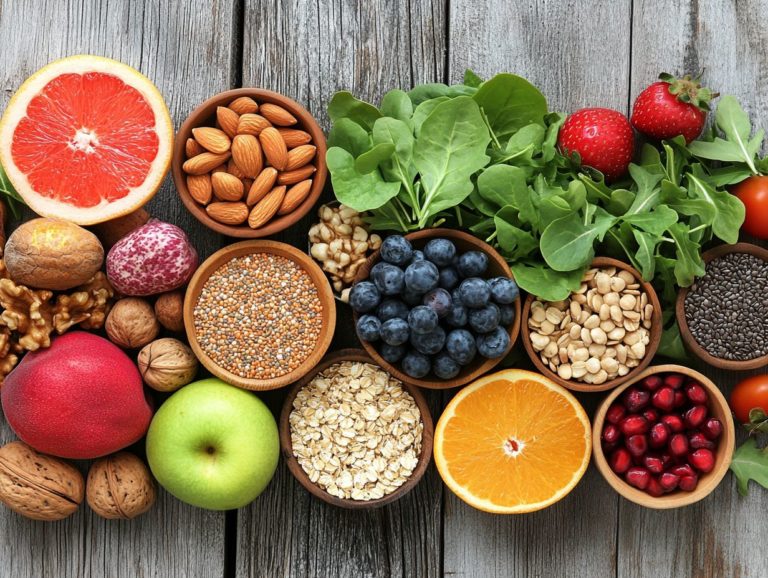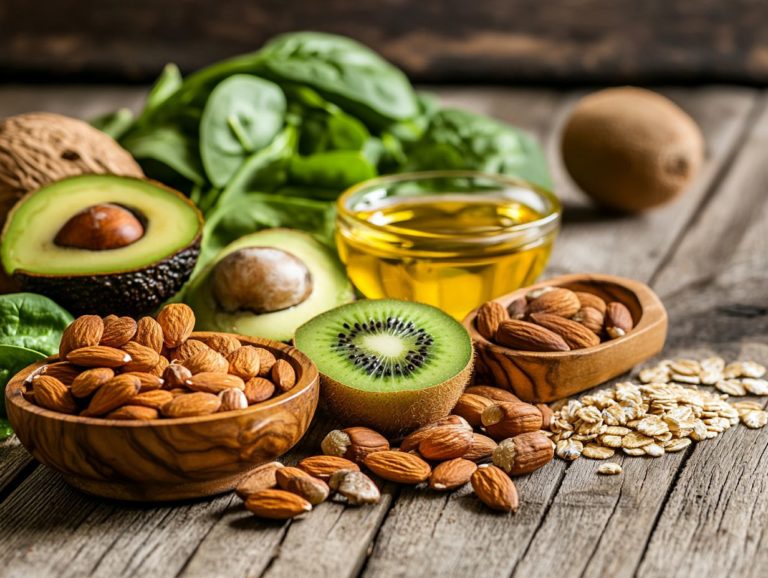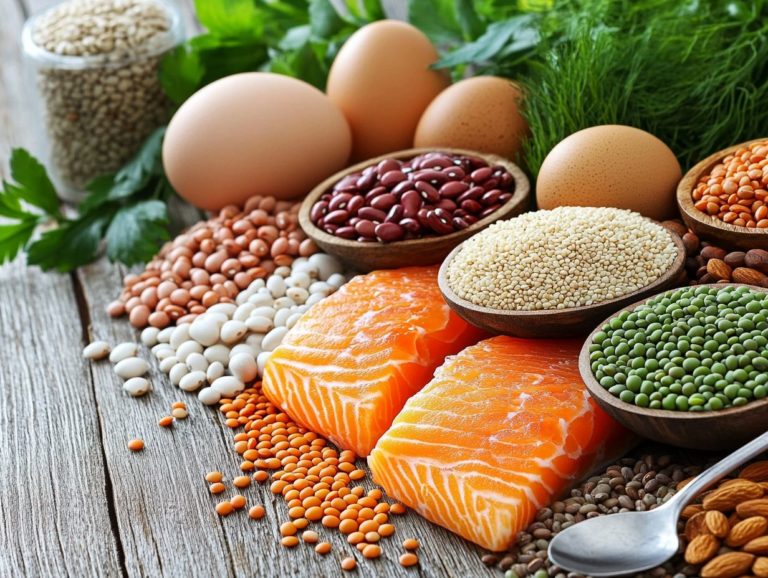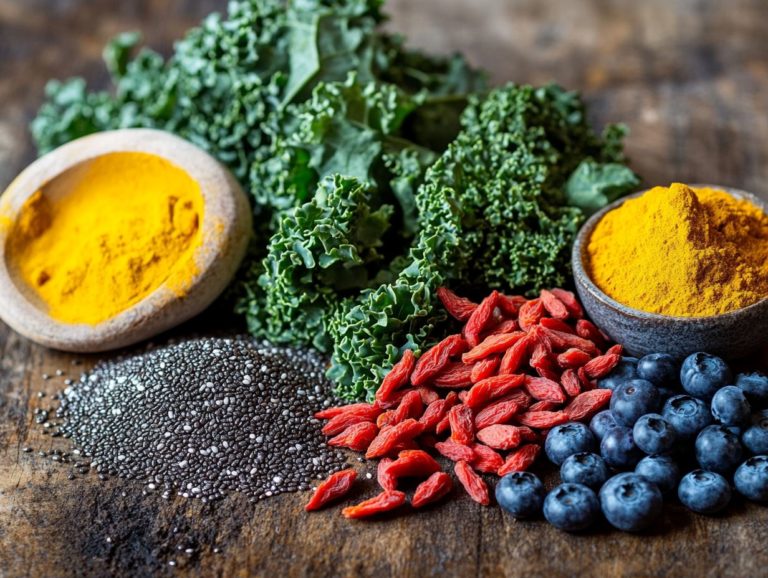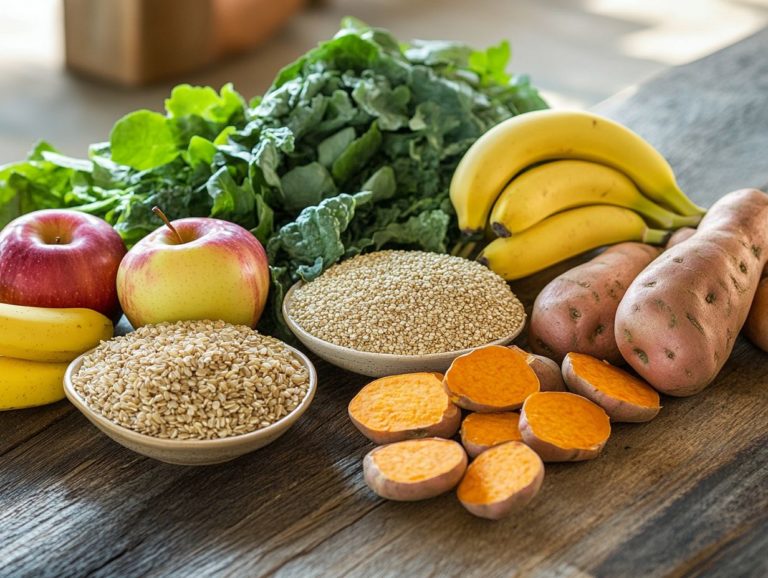Best Food Sources of Potassium to Include
Potassium is a vital mineral that helps your body function well. It plays an important role in maintaining your overall health, helping to regulate blood pressure and support muscle function.
With an array of delicious options at your fingertips, boosting your potassium intake through your diet has never been easier.
Explore 15 of the best food sources of potassium, ranging from the beloved banana to the nutrient-packed salmon. You ll also find tips on the recommended daily intake, signs of deficiency, and creative ways to weave these foods into your meals.
Dive in now to explore how to nourish your body with potassium-rich goodness!
Contents
- Key Takeaways:
- 1. Discover the Power of Bananas
- 2. Boost Your Health with Avocados
- 3. Enjoy the Nutritional Benefits of Sweet Potatoes
- 4. Spinach
- 5. White Beans
- 6. Salmon
- 7. Edamame
- 8. Acorn Squash
- 9. Dried Apricots
- 10. Yogurt
- 11. Coconut Water
- 12. Pomegranate
- 13. Beet Greens
- 14. Prunes
- 15. Tomato Sauce
- What Is the Recommended Daily Intake of Potassium?
Key Takeaways:
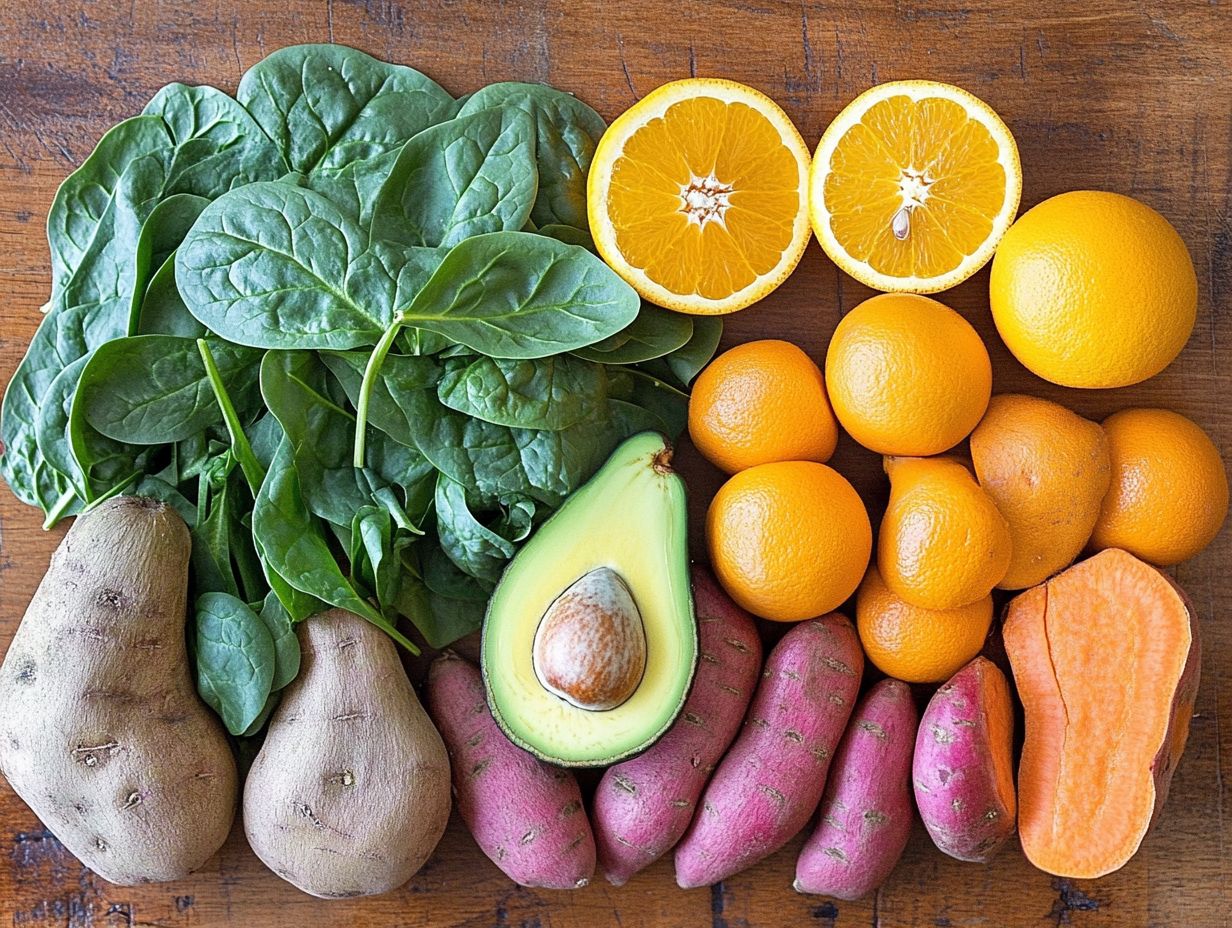
Include bananas, avocados, and sweet potatoes in your diet for a healthy dose of potassium.
Get your daily intake of potassium from foods like spinach, white beans, and edamame.
Incorporate salmon, dried apricots, and yogurt into meals for additional health benefits from potassium-rich foods.
1. Discover the Power of Bananas
Bananas are an incredible source of potassium, an essential mineral that supports heart health and regulates blood pressure.
A medium-sized banana packs about 422 milligrams of potassium, making it a significant contributor to your daily intake. By incorporating bananas into your balanced diet, you can improve your sodium-to-potassium ratio, which is crucial for overall cardiovascular health.
Higher potassium intake is linked to a decreased risk of stroke and heart disease, while also helping to prevent kidney stones and osteoporosis. Bananas also help your body use potassium effectively, maintaining proper fluid balance and muscle function.
This enhancement can boost your overall physical performance and well-being, no matter what stage of life you’re in.
2. Boost Your Health with Avocados
Avocados are not only a delightful addition to your meals; they re also a powerhouse of potassium. If you’re aiming to boost your intake of this essential mineral, avocados are the perfect choice.
With approximately 975 milligrams of potassium packed into a single avocado, you re getting a significant portion of the recommended daily intake. This mineral is vital for regulating blood pressure and supporting overall cardiovascular function.
By incorporating avocados into your daily meals, you can easily meet your potassium requirements, as dietary guidelines encourage the consumption of various potassium-rich foods. These creamy gems elevate your culinary creations and contribute to heart wellness.
Additionally, they lower the risk of chronic diseases like hypertension and stroke. Their rich nutrient profile, filled with healthy fats and fibers, makes avocados a smart choice for anyone looking to enhance their health.
3. Enjoy the Nutritional Benefits of Sweet Potatoes
Sweet potatoes are a powerhouse of nutrients, overflowing with potassium an essential mineral that helps maintain bone density and overall health.
With their impressive potassium content, sweet potatoes can significantly help reduce the risk of potassium deficiency in your diet. This vital mineral is crucial for regulating fluid balance, nerve function, and muscle contractions.
Moreover, potassium supports bone health by counteracting calcium loss, enhancing bone density, and lowering the risk of osteoporosis. Incorporating sweet potatoes into your meals is effortless; you can roast, mash, or even blend them into soups.
They re a versatile staple for anyone looking to naturally boost their potassium intake. Start adding these potassium-rich foods to your meals today for a healthier you!
4. Spinach
Spinach is a leafy green powerhouse, full of potassium a mineral essential for your body’s potassium metabolism and crucial for various functions, including muscle contraction and heart health.
By adding spinach to your diet, you can significantly boost your potassium intake, which is vital for maintaining fluid balance and reducing blood pressure. Adequate potassium levels are important for optimal muscle function, enabling smooth contractions and preventing cramps during physical activity.
This nutrient also plays an important role in promoting heart health by helping regulate your heartbeat and supporting overall cardiovascular function.
To truly maximize the health benefits, consider lightly steaming or saut ing spinach with garlic and olive oil. These cooking methods enhance nutrient absorption while retaining the vibrant flavors of this versatile green, making it a delicious addition to your meals.
5. White Beans
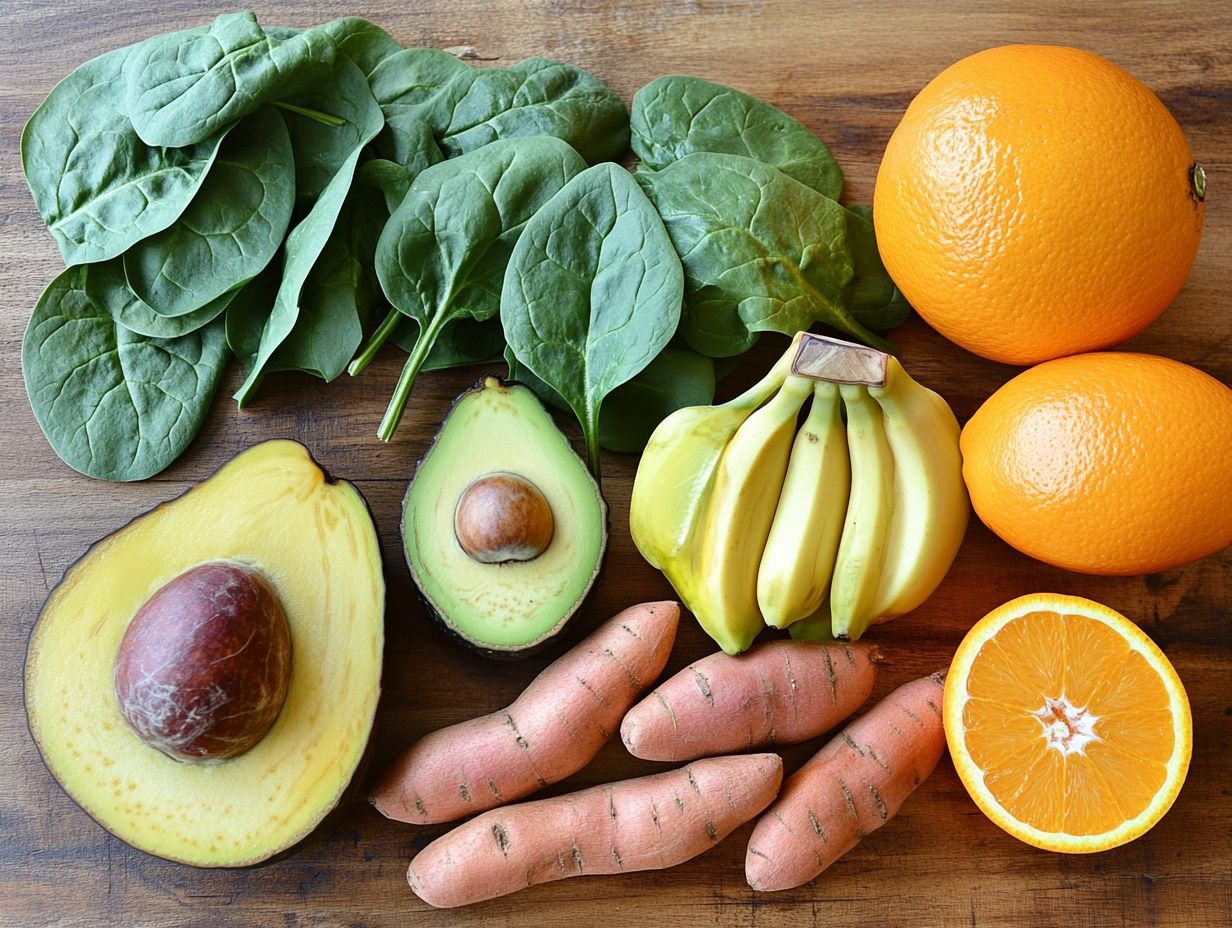
White beans are an exceptional source of potassium, providing a substantial amount of this vital mineral. This is important for preventing potassium deficiency and supporting your overall health, especially in maintaining healthy blood pressure levels.
By incorporating these legumes into your diet, you can easily meet your daily potassium requirements, essential for optimal muscle function and effective nerve signaling.
Your heart stands to gain significantly from sufficient potassium intake, as it plays a crucial role in regulating your heartbeat and lowering the risk of cardiovascular diseases.
The versatility of white beans makes them a seamless addition to various dishes, from comforting soups and hearty stews to vibrant salads and flavorful dips. You can easily jazz up your meals while promoting heart health and overall wellness deliciously.
6. Salmon
Salmon is an excellent source of omega-3 fatty acids, a type of healthy fat good for your heart, and a generous provider of potassium. It supports cardiovascular function while helping maintain optimal potassium levels in your body.
With around 400-500 mg of potassium per fillet, enjoying this fish is a great way to elevate your daily intake, crucial for managing blood pressure and lowering the risk of heart disease.
Incorporating salmon into your meals can be both effortless and delicious. Consider baking it with a mix of herbs and lemon for a main dish bursting with flavor. You might also add it to salads or grain bowls featuring spinach, quinoa, and avocados for a nutritious twist.
A colorful salmon stir-fry with a variety of vegetables not only boosts your potassium intake but also promises a delightful culinary experience. Don t miss out on these delicious ways to boost your health!
7. Edamame
Edamame, those delightful young soybeans, serve as a nutritious snack high in potassium and offer essential benefits for potassium metabolism. They make an excellent addition to your balanced diet.
This vibrant green legume plays a significant role in boosting your daily potassium intake and supports your overall cardiovascular health by helping manage blood pressure levels.
Incorporating such versatile foods into your meals enhances your dietary options, whether you toss them into salads, stir-fries, or simply enjoy them as a standalone snack.
The high fiber content in edamame aids digestion and promotes a sense of fullness, making it a satisfying choice for those who prioritize health.
By including these young soybeans in your meals, achieving an optimal potassium balance becomes effortlessly attainable while savoring a delicious and wholesome treat. Try adding them to your next meal for a tasty boost!
8. Acorn Squash
Acorn squash is not just any vegetable; it’s a delicious and nutritious powerhouse. It is high in potassium. This makes it a great option for boosting your potassium intake while enjoying delicious meals.
This hearty gem delivers about 896 milligrams of potassium per serving, which is essential for maintaining fluid balance and regulating blood pressure. It ensures that your muscles and nerves function properly.
Incorporating acorn squash into your cooking options can significantly enhance both flavor and nutritional value. Try roasting it with olive oil and herbs it’s a treat!
You could also stuff it with quinoa and vegetables for a wholesome main dish or blend it into soups for a luxuriously creamy texture. By experimenting with various preparation methods, you can enjoy the enchanting flavors of acorn squash while reaping its potassium benefits.
9. Dried Apricots
Dried apricots are a delightful and nutritious snack. They are rich in potassium. This helps prevent deficiency and supports heart health.
This essential mineral plays a vital role in regulating blood pressure and balancing electrolytes. Incorporate dried apricots into your diet to savor their delightful flavor while reaping a multitude of health benefits.
Think about adding them to your yogurt, oatmeal, or salads for a vibrant twist. Pair them with nuts for a satisfying trail mix, or blend them into smoothies for a delicious and nutritious drink that fuels your day.
With these simple additions, boosting your potassium intake has never been easier or tastier.
10. Yogurt

Yogurt isn’t merely a healthy food; it’s also a remarkable source of potassium. It offers a plethora of health benefits that support potassium metabolism and promote heart health.
This creamy delight can significantly enhance your daily potassium intake, delivering about 300-400 mg of potassium per serving. This not only aids in regulating blood pressure but also ensures your muscles function properly.
Eating yogurt regularly boosts your heart health and plays a pivotal role in digestive wellness by nurturing a balanced gut microbiome, effectively warding off issues like constipation and bloating.
To elevate your potassium intake, consider weaving yogurt into your meals in delightful ways. You could:
- Blend it into smoothies
- Layer it in parfaits
- Whisk it into salad dressings
Alternatively, enjoy it as a topping with potassium-rich fruits such as bananas and avocados, transforming your diet into a nutritious and delightful experience.
11. Coconut Water
Coconut water is an exceptionally refreshing drink that s rich in potassium. It acts as an excellent natural hydrator to help you maintain that vital potassium balance. It offers a wealth of health benefits, especially for those leading active lifestyles.
This tropical delight doesn t just replenish the electrolytes you lose through sweat; it also serves as a delicious and healthier alternative to traditional sports drinks, which often come packed with sugar and artificial ingredients.
By weaving coconut water into your daily routine, you can indulge in a naturally low-calorie option that promotes optimal hydration and boosts your energy levels. Its natural potassium content is essential for muscle function and can help ward off cramps, making it particularly advantageous for athletes.
With many people seeking healthier choices, coconut water stands out as a refreshing option for hydration and recovery.
12. Pomegranate
Pomegranate is packed with nutrients. It offers a generous dose of potassium, which is great for your heart and blood pressure.
This tasty fruit is full of antioxidants. They help reduce inflammation and lower the risk of chronic diseases like heart disease and diabetes.
To enjoy pomegranates, try these options:
- Sprinkle juicy arils over salads for a refreshing crunch.
- Blend them into smoothies for a nutrient boost.
- Enjoy them as a simple snack.
By including this vibrant fruit in your meals, you can enjoy its unique tart flavor while reaping its health benefits.
13. Beet Greens
Beet greens are often overlooked, but they are a fantastic source of potassium. They add great versatility to your meals.
These leafy greens support heart health and help regulate blood pressure. They also play a crucial role in muscle function and nerve signaling.
You can incorporate beet greens into smoothies, salads, or stir-fries. Saut ing them with garlic and olive oil transforms them into a delicious side dish.
Embrace these nutrient-rich greens to boost your potassium intake while enjoying your meals!
14. Prunes
Prunes are well known for their digestive benefits. They are also an excellent source of potassium, helping to prevent deficiency.
A handful of prunes provides about 300 mg of potassium, essential for muscle function and heart health. They are rich in antioxidants and vitamins, enhancing overall wellness.
Incorporate prunes into your daily meals easily:
- Add them to granola.
- Toss them into salads.
- Blend them into smoothies.
Or, enjoy a few on their own as a tasty, nutritious snack!
15. Tomato Sauce
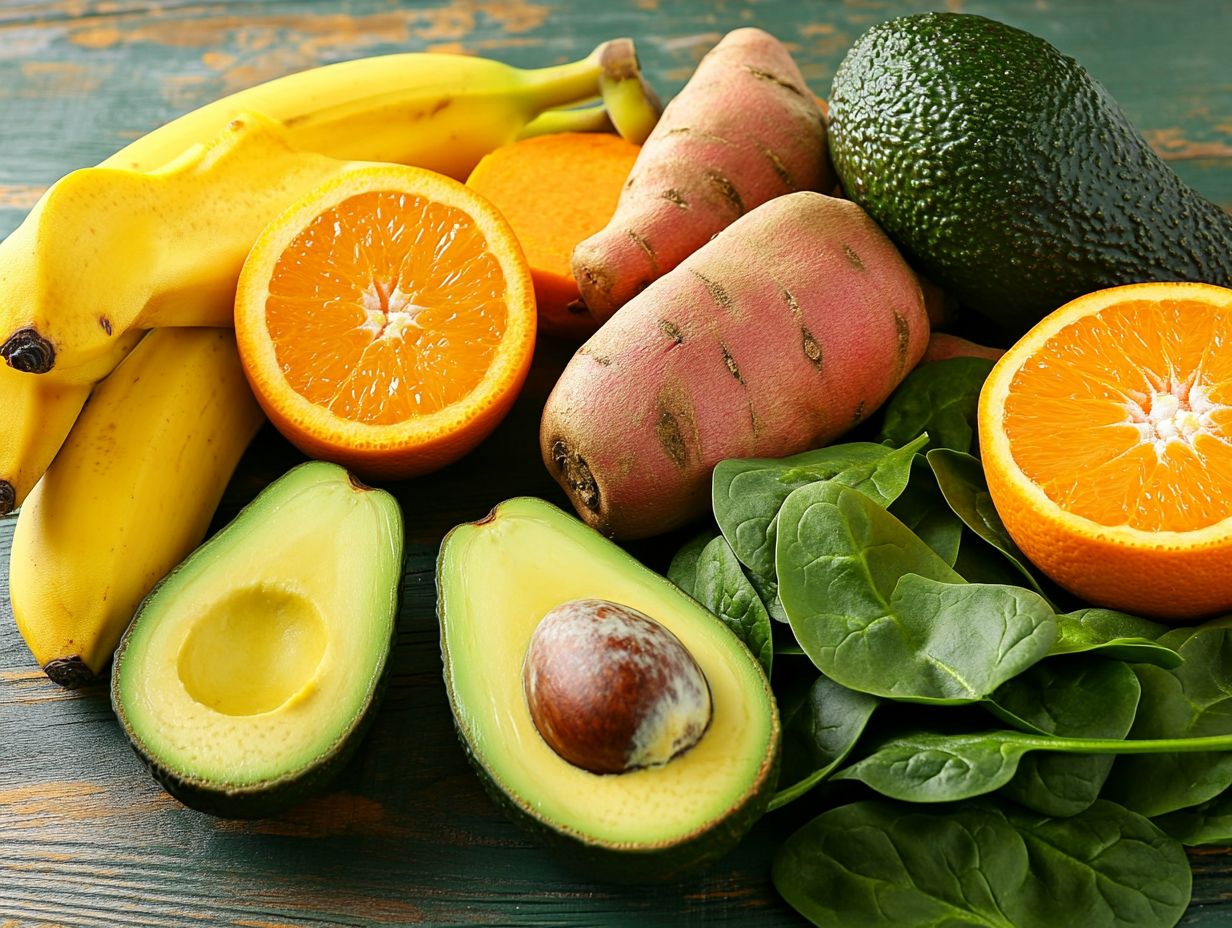
Tomato sauce is not just a kitchen staple; it s a fantastic source of potassium. It can enhance your meals while providing health benefits.
This essential mineral helps maintain heart function and regulate blood pressure. Incorporating tomato sauce into your dishes boosts flavor and nutrition.
To increase your potassium levels, whip up a hearty marinara sauce. Serve it over whole-grain pasta or use it in a vibrant chili.
What Is the Recommended Daily Intake of Potassium?
Knowing the recommended daily intake of potassium is important for good health. The U.S. Dietary Reference Intakes provide guidelines to ensure you get enough of this vital mineral.
As an adult, aim for about 2,500 to 3,000 mg per day. If you exercise heavily, you may need more to replace lost electrolytes.
Getting enough potassium helps regulate blood pressure, muscle function, and nerve signaling. This can lower your risk of hypertension and heart disease.
Different groups, like athletes, pregnant women, and older adults, have unique potassium needs. Adjust your intake to meet your specific requirements for the best health benefits.
Why Is Potassium Important for Our Health?
Potassium is a crucial mineral that plays a significant role in various bodily functions. It regulates blood pressure, supports heart health, and facilitates muscle contractions.
This essential nutrient helps prevent chronic diseases and maintain potassium balance. It assists in managing blood pressure levels and supports kidney function, ensuring that waste products are efficiently cleared from your body.
A balanced intake of potassium is vital for muscle contraction, enabling seamless communication between your nerves and muscles.
Research consistently underscores the necessity of maintaining adequate potassium levels, linking higher intakes to a reduced risk of hypertension and improved cardiovascular health.
Research shows that potassium may enhance athletic performance and recovery, emphasizing its importance in a well-rounded diet. Don t wait to boost your health!
What Are the Symptoms of Potassium Deficiency?
Potassium deficiency, commonly known as low potassium levels, can lead to symptoms that impact your overall health. You might experience muscle weakness, cramps, fatigue, and abnormal heart rhythms, highlighting the importance of maintaining adequate potassium levels.
This condition often develops from not getting enough potassium in your diet, chronic illnesses, or excessive loss due to vomiting, diarrhea, or certain medications. If potassium deficiency occurs, you may notice shifts in your mood, digestive issues, and in severe cases, respiratory problems.
Low potassium levels can pose significant health risks, potentially leading to life-threatening situations like cardiac arrest. To prevent these deficiencies, focus on incorporating potassium-rich foods into your diet. Here are some delicious potassium-rich foods to include in your diet:
- Bananas
- Spinach
- Sweet potatoes
- Avocados
By ensuring you meet the daily recommended levels of potassium, you can promote optimal well-being and keep your health in check. Make these changes today to elevate your health!
How Can One Incorporate These Foods into Their Diet?
Incorporating potassium-rich foods into your diet can be delightful and advantageous, helping you meet your daily potassium needs while enjoying versatile meal options.
By exploring various culinary avenues, you can easily introduce foods like bananas, sweet potatoes, spinach, and legumes into your breakfasts, lunches, and dinners. Imagine kickstarting your morning with a smoothie brimming with spinach and banana, or savoring a hearty sweet potato hash for brunch.
For lunch or dinner, toss chickpeas into a vibrant salad or prepare a savory stir-fry featuring broccoli and bell peppers.
These foods enhance muscle function and nerve health. A balanced diet rich in potassium can help regulate blood pressure and ward off heart-related issues, ensuring your overall well-being. Start enjoying these powerful foods today!
What Are Some Other Benefits of These Potassium-Rich Foods?
Potassium-rich foods provide a wealth of advantages that extend far beyond simply boosting your potassium levels. They contribute to enhanced heart health, improved bone density, and a lower risk of chronic diseases.
Incorporating foods like bananas, avocados, and sweet potatoes into your diet plays a vital role in managing blood pressure, which reduces your risk of heart-related issues.
Research consistently shows that individuals who consume adequate amounts of potassium experience a notable decline in the incidence of strokes and other cardiovascular ailments. This important nutrient also supports effective muscle function, leading to better exercise performance and recovery.
Studies suggest that maintaining balanced potassium levels can significantly benefit bone health by counteracting calcium loss. This reinforces potassium s protective qualities against osteoporosis and various metabolic conditions, showcasing its importance in your overall well-being.
Frequently Asked Questions
What are the best food sources of potassium to include in my diet?
The best food sources of potassium include bananas, sweet potatoes, avocados, spinach, white beans, and salmon. These foods are not only delicious but also a great way to boost your potassium levels!
Why is it important to include potassium in my diet?
Potassium is an important mineral that plays a crucial role in the proper functioning of the body. It helps regulate blood pressure, maintain fluid balance, and support muscle and nerve function.
Are there any fruits that are good sources of potassium?
Yes, several fruits are excellent sources of potassium, including bananas, apricots, cantaloupe, and kiwi. These fruits offer a good amount of potassium for a healthy diet.
What are some ways to incorporate more potassium-rich foods into my meals?
You can easily add more potassium-rich foods to your meals by putting avocado on your toast, adding banana slices to your cereal, or including beans in your soups or salads. Snacking on dried apricots or enjoying a baked sweet potato as a side dish is also a great idea!
How much potassium should I aim for in my daily diet?
The recommended daily intake of potassium for adults is 4,700 mg. However, this may vary based on individual needs and health conditions. It s best to consult with a healthcare professional to determine the appropriate amount for you.
Can too much potassium be harmful?
Yes, too much potassium in the body can lead to a condition called hyperkalemia, which is when potassium levels become too high. This can cause symptoms such as irregular heartbeat, muscle weakness, and nausea. It is important to consume potassium in moderation and consult with a healthcare professional if you have any concerns.
For personalized advice, consider discussing your potassium intake with a healthcare professional!


